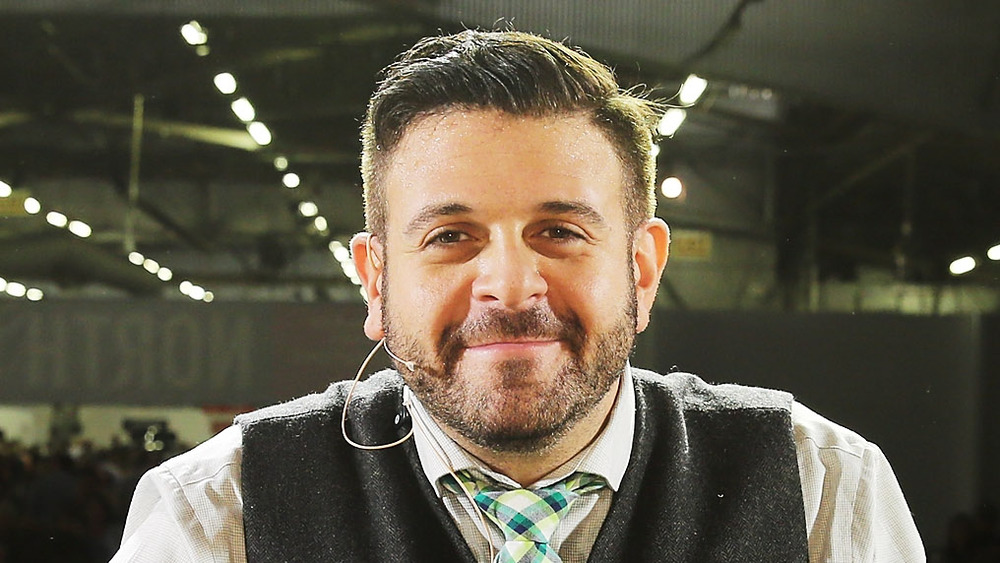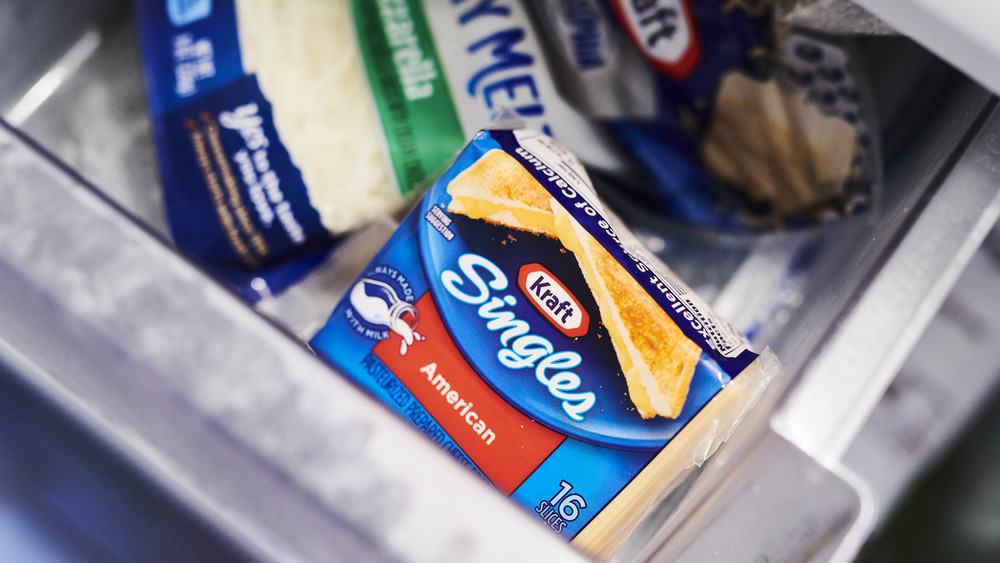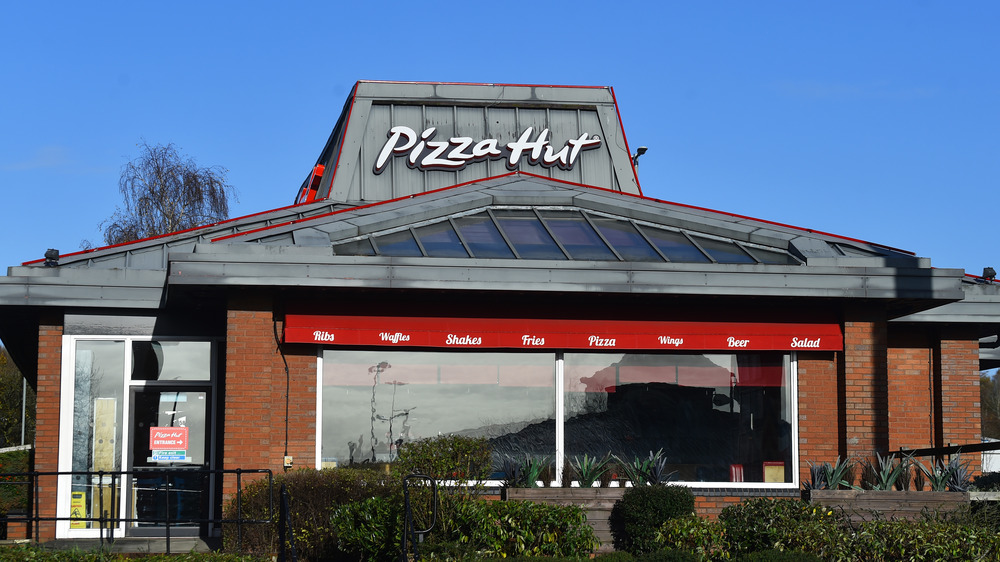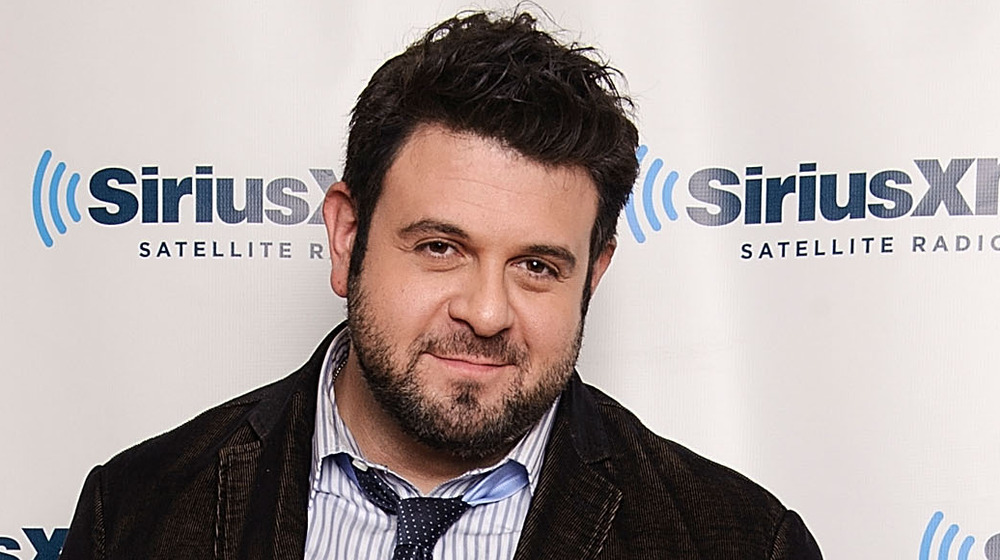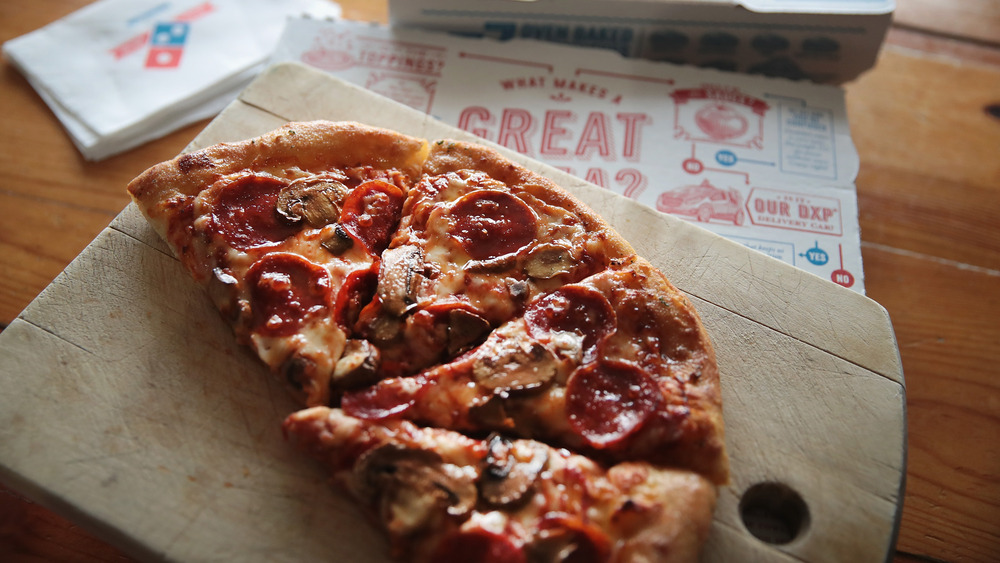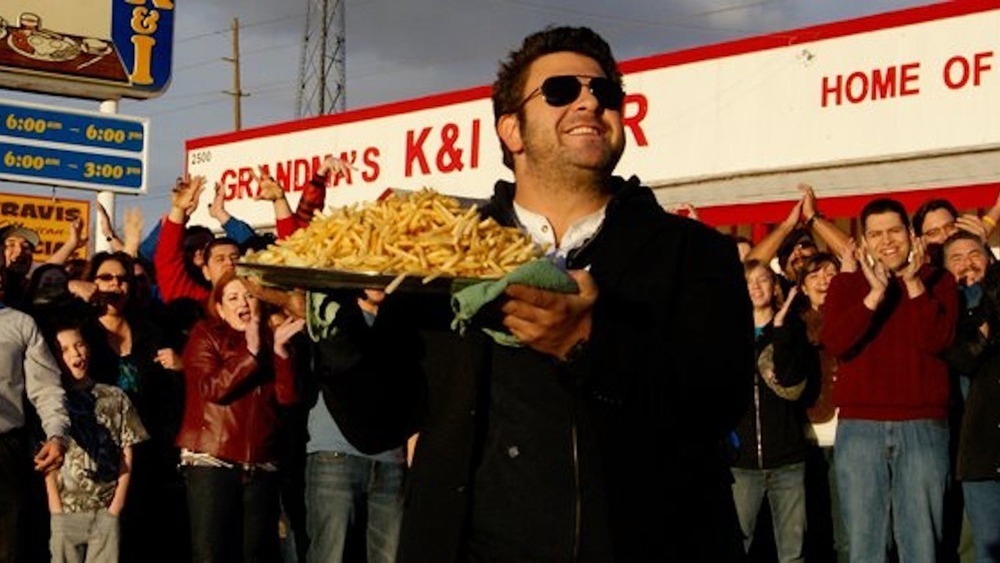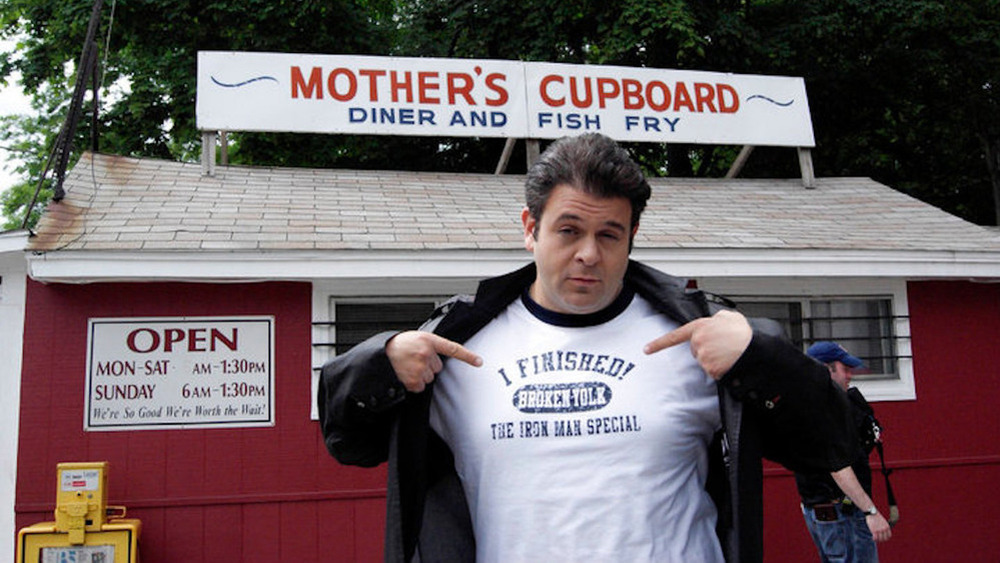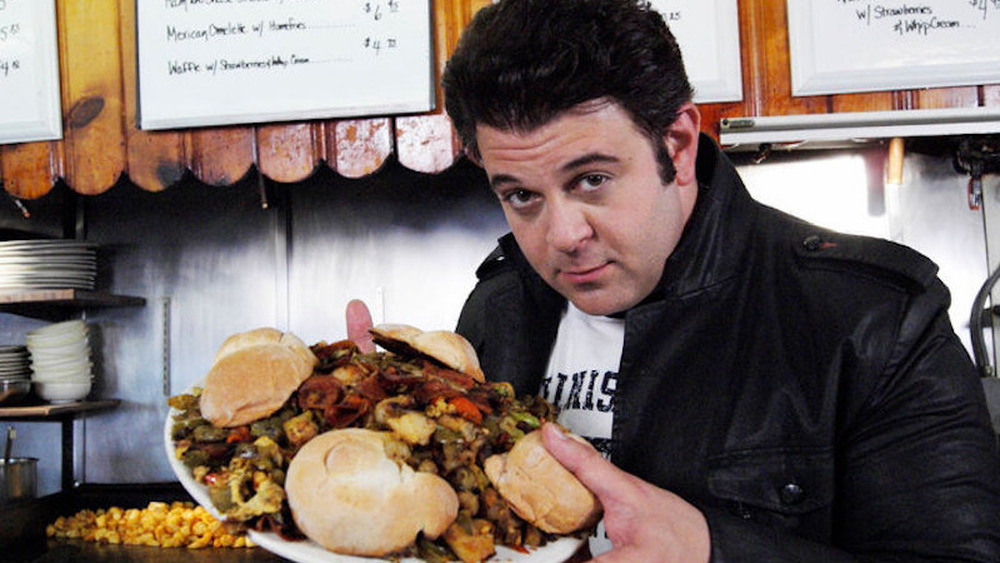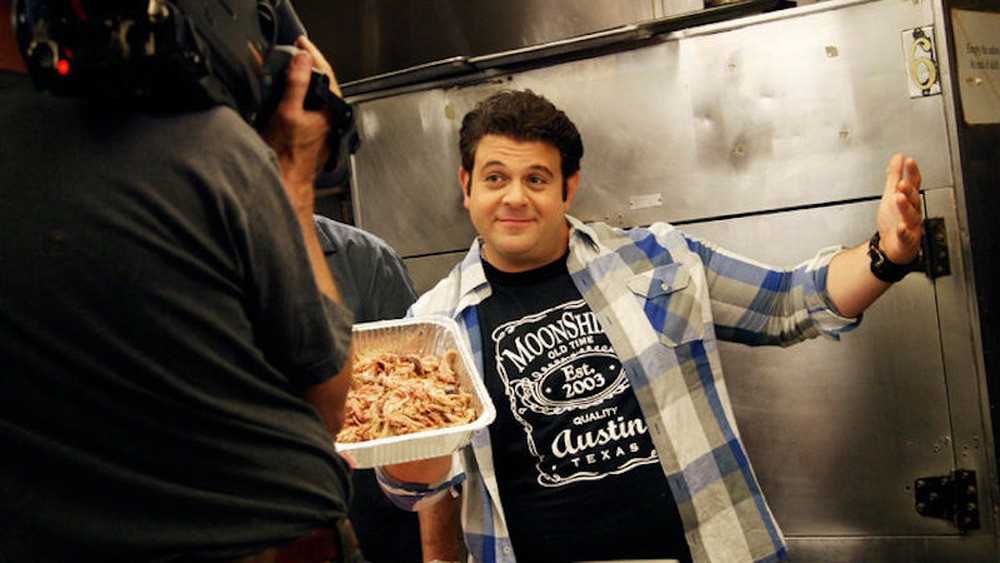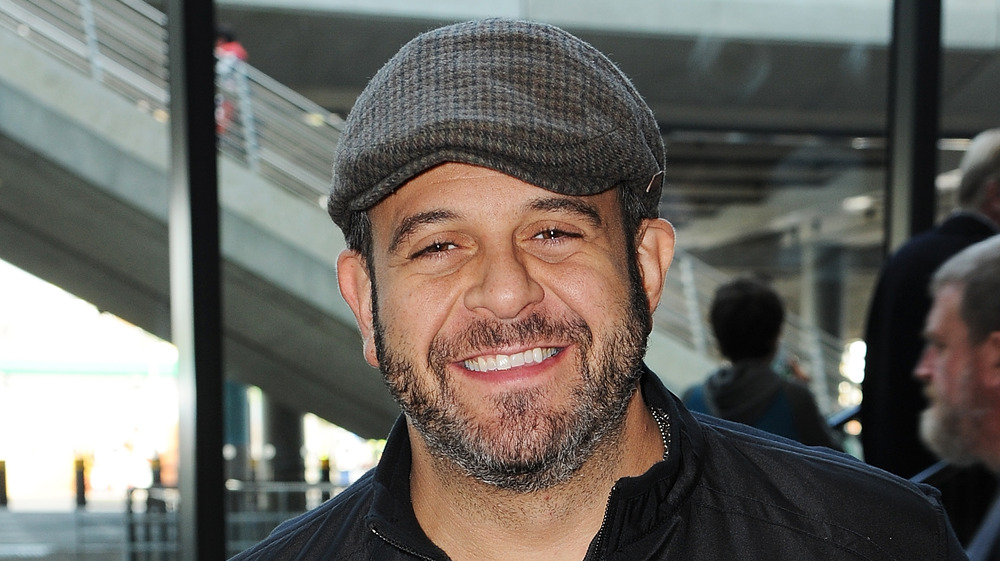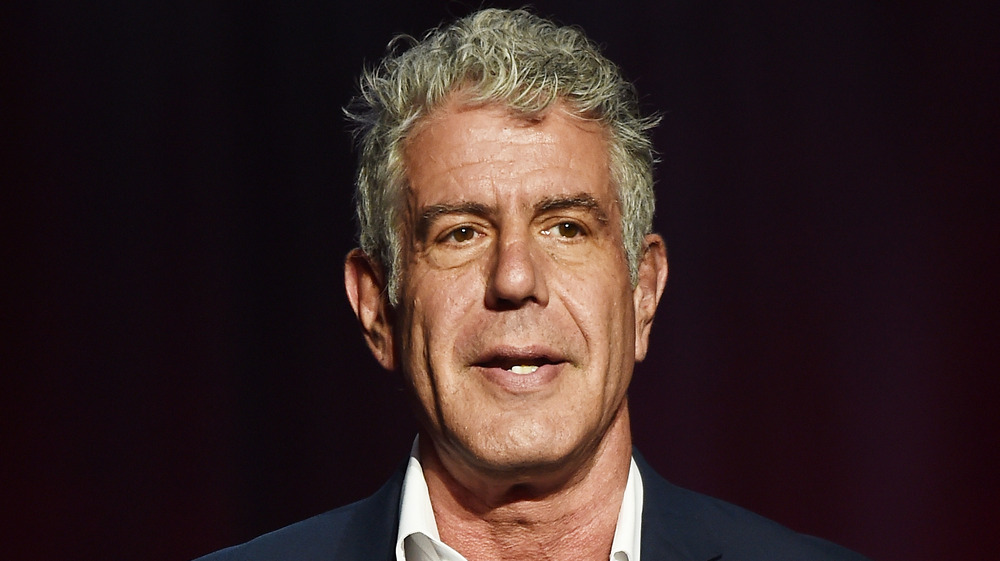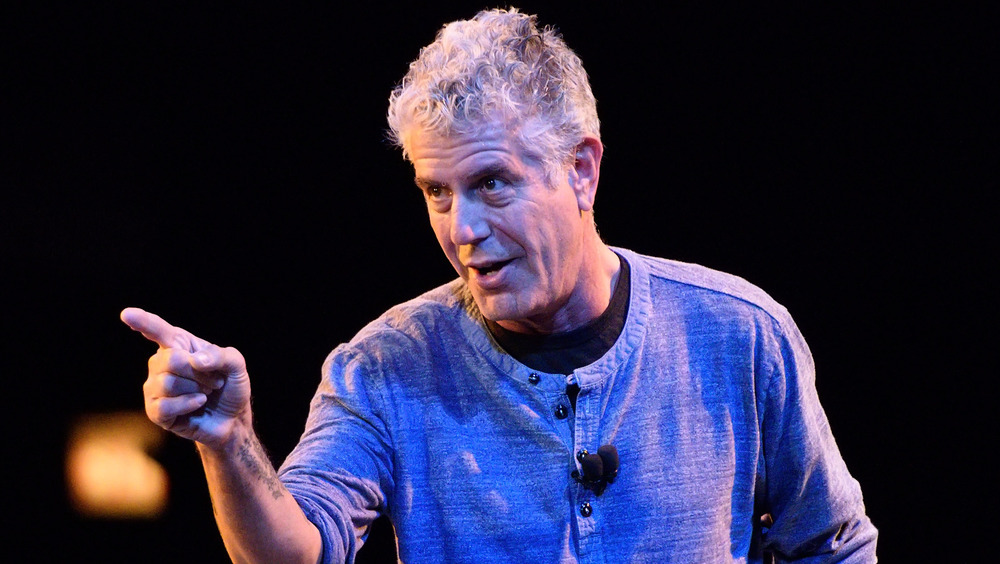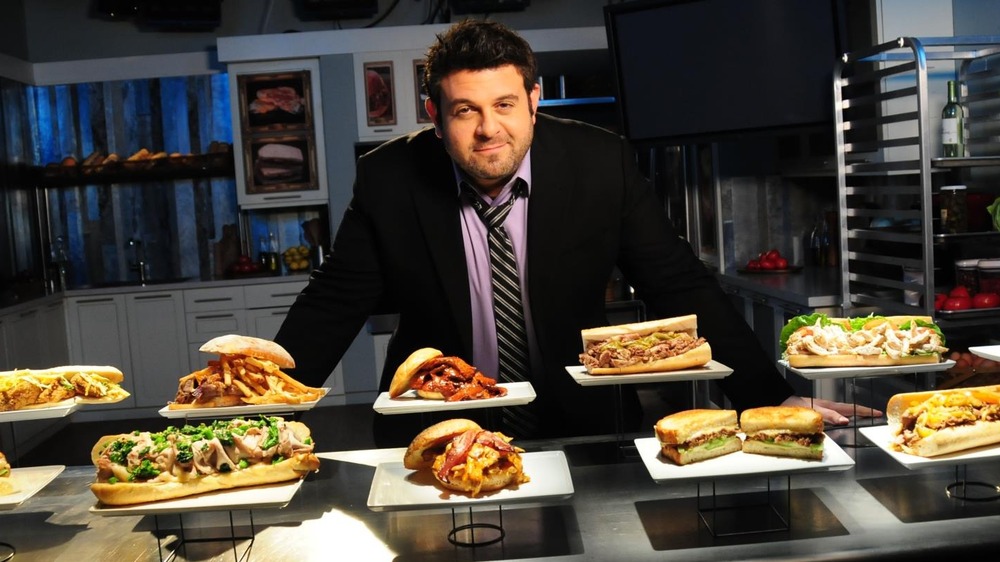Adam Richman Talks Modern Marvels And Food Ingenuity, Man V. Food, And More - Exclusive Interview
Adam Richman has good reason to be amazed by food. From his Man v. Food days, filled with gargantuan grub and some of the spiciest snacks you've ever tasted, to his new projects, exploring the insane innovations that make food what it is today, Richman has really seen it all. These days, you can catch Richman on the History Channel. He's the current host of the revived Modern Marvels series, as well as a contributor on The Food That Built America.
Mashed caught up with Richman to learn more about his new shows, and take a walk down memory lane as well. Richman passionately explained why he's so fascinated by food history, and what we can learn from the foods we reach for every day. Richman also recalled some of his favorite (and not-so-favorite) moments from Man v. Food, and shared his thoughts on the changing landscape of food in the media.
Adam Richman on hosting Modern Marvels
You're the new host of the Modern Marvels revival. What has been the best part for you of doing this show?
Well selfishly, I have to say I'm a History Channel fan, or I guess, to be cool with the kids, I was a History Channel Stan. So getting to work for that network is huge for me because I've been a watcher. That's been big for me personally.
I like anything that gives people the keys to the kingdom, gives people knowledge that they otherwise wouldn't have, and a level of appreciation they otherwise wouldn't have, for the stuff around them.
I love the fact that it's not just that we're showing you how cool things are made, but we're giving you a real, real sense of how entrepreneurs and hardworking Americans are pushing the food industry and technology into the next century, next vanguard.
Americans eat a lot of processed food. There's no question about that. And sometimes it's almost like if we knew exactly what went into making it or how it was made, maybe we would think twice about some of those things. Modern Marvels is the opposite of that. It's like let's pull back the curtain. What is the takeaway there?
The two things that I remember hearing were the two things you never want to see being made are TV and sausage. And then I remember having to film at a sausage factory. And I was like, "What do I do now?"
The thing is, as phenomenal as this technology may be, as cool as it is to watch ... to see it in practice, it's nothing without the skilled people behind it. And all across America, there are people that put 10, 20, 30, even 50 years into these factory lines. And these are the people who don't have their name on the label.
So I think for me, it is just exactly that, that whether it's fast food or whether it's snack food, that there is a lot of hard work, a lot of ingenuity, a lot of technical ingenuity that goes into these sort of everyday little wonders that we maybe don't appreciate, just simply because we're not exposed to it. And I think that we do a nice balance in Modern Marvels between the big brands and the little brands.
So we'll go to Wise Potato Chips that's been around for a hundred years. It has employed the town of Berwick, Pennsylvania for hundreds of years. But then we'll go to a little teeny weeny cheese maker in Spring Grove, Pennsylvania.
And I think what's so cool for me is the amount of inspiration behind it. Like yeah, sure. We've all done the processed American cheese slice, and we all had very fancy Brie and we've got very different opinions of both. But food safety in America largely exists because of that processed cheese slice and Kraft's innovations with it.
I think that people that are going to leave Modern Marvels very hungry, with a whole bunch of jaw-dropping no way moments.
For me, that feeling of you don't want to see the sausage being made, no. You know what? See the sausage being made because you will absolutely have product confidence in the American marketplace like you never have before.
Adam Richman on what we can learn from The Food That Built America
What would you say fans can look forward to and expect when they tune in to The Food That Built America?
We hear Heinz, we hear Hershey, we hear Birdseye, we hear Wise, and ... we think about brands. We don't think they're people. We don't think that there was once a guy named Milton Hershey who put on his pants, one leg at a time. That there was a man named Clarence Birdseye. That the Toll House recipe was created by a woman who worked at the Toll House Inn. That two guys, two brothers, named the Carney brothers in Wichita, Kansas, started Pizza Hut.
We take it for granted because we think of them as sort of part of the landscape, part of the furniture, like they've always been here. But they haven't. And I think that it's cool to demystify these brands. It's cool to see the people behind the package. And I think that in a time when so many people are struggling or have been coming through struggle, that I think it becomes really relatable. And I think you will also get more cool little nickel knowledge about these brands than you'll ever know.
For example, Pizza Hut. The Carney brothers bought this business for 600 bucks. They dropped out of school. They bought this place. They wanted to make pizza, didn't know anything about it. They leveraged every penny they had. They had a freebie sign, a sign that the Coca-Cola company had given them, and can only fit eight letters on it. Five letters had to be pizza, which left them three. So they were trying pizza pit. And they went, "Not pizza pit." And they went, "Pizza Hut?" And that's what they went with.
Or my favorite story is Frank Epperson in San Francisco. He was drinking a fruit drink, and it had a stir stick. He left it on his porch overnight. Came back out, it had frozen. And he pulls it out by the stir stick. And he's like, "Oh, this is delicious." So he starts making it for friends, selling it locally, making it for his kids. His kids called it pop's icicle. Pop's icicle became Popsicle.
That's the stuff that I find really galvanizing because for me, again, it's not a brand that's existed forever. It was a moment of inspiration. It's the moment of cleverness.
People don't realize how much the food industry and these people behind it have shaped how we live our lives as consumers, not necessarily the other way around. Do you feel like that's a big thing the show is trying to say?
I think it's a little bit of a balance. Sometimes you've got to put something out there and do it like when Curtiss [Candy Company] created the Baby Ruth. [Otto Schnering] realized the chocolates had nuts, chocolates had caramels, chocolates had nougat, but no bar had all of them. And he created something with all of them. Just very clever market research.
We have to recall that a lot of these guys had to build the machines to make this stuff. Like the Fig Newton ... the man who can read the recipe in his mind didn't have the technology to create it in a practical sense in the real world. So he had to invent it.
So I think that you have these innovators and then you have to figure out how to move that forward. So I think that The Food That Built America is very much where you get to see that if you dream it, you can be it, you can make it happen.
Adam Richman on why food history is so important
Where does your passion for history and food history come from? And what do you think are some of the most important things we can learn?
I guess for me, because I worked as a cook and worked in several restaurants ... I come to food from a very different place. Not as a formerly trained chef ... I've always appreciated culinary anthropology. I've always appreciated the story that food tells. And I think that speaks to more people. because more people are home cooks. I think more people can relate to... necessity.
Like [H. B.] Reese burning his batches of roasted peanuts and the peanut butter had this sort of bark roasted flavor. And he's like, "No, this is good. This is what I want." Then it was one guy's mistake. The cornflake was an accident. The idea that this happy accident works, to me ... moms are doing that in kitchens every single day — dads, too. You know what I mean? And I think that speaks more to people. So for me, I really enjoy and I really relate to the language that food speaks. And I think the history of it is very much part of that language.
New York native Adam Richman shares his thoughts on pizza
Are you team Pizza Hut or Domino's?
That's a great question. I'm so arrogant. I'm from Brooklyn. I'm spoiled.
You're a New Yorker.
Exactly right. That's right there one of the cool things. Pizza Hut was realizing that their pizza wasn't selling very well on the East Coast. And they decided that they were going to make something else. They made the pan pizza. And the idea was, "We're not going to try to be you. We're not going to try to do Neapolitan pizza. We're going to try to do this thing, this other thing."
This is a very, very tough call. I haven't been to either one in a while. I always have very fond memories of going to Pizza Hut as a kid with the red glasses. They always had the good ice. And I always liked the sort of the French breaded crust. The only thing I ever had an issue with was the little pellets of meat, the little sausage pellets and meat pellets.
I'm going to give the slight edge to Domino's thin crust, just by virtue ... I think they both have their merits too. They both employ a ton of Americans.
I love pizza. I think pizza is proof God loves us and wants us to be happy. But I don't think anybody would ever go, "Yeah. Two brothers in Ypsilanti, Michigan, and two brothers of Wichita, Kansas, are going to do more for the growth of pizza than any other Italian chef in the country."
And I even love the fact that one of the brothers from the Domino's family, he didn't like this whole just switching to pizza thing, just doing delivery. He didn't like it. So he left. He said, "You can have my half of the company, and I get to keep the Volkswagen bug." And his half of the company is worth $800 million now ... That's a bad trade baby. That's a bad call.
Adam Richman is grateful for his Man v. Food experience
Let's go down memory lane a little. Let's talk about Man v. Food. What do you miss most about your experience filming and making that show?
I mean, I miss my crew. We were very much a family, and we're still in touch. But I miss them very much. I miss going to the mom and pop restaurants very much. People always wanted me to say, "Oh! I love having all the barbecue. I love having all the fried chicken." That's cool. But anyone can go to these restaurants and buy that. But it was the people and seeing the country, I think, that I miss and value the most.
Look, I'm very, very competitive by nature. And I do not like losing. And I think that I was never the best eater in the world. And there are times I look back and I look at what I ate, and I realized it was so much about force of will and not wanting to lose on television.
And I'm not a pro boxer, and I don't play in the NBA or something like this. So there is something about going into a room and people cheer your name. And they have something vested in your success. So there is something about the thrill of combat, and that moment in trying to be the people's champion.
That show did so much good for so many independent businesses. There really was nothing quite like going to a place in a town you've never been to before. You're going to Cotham's Mercantile for the hubcap cheeseburger outside of Little Rock. You're going to Grey Brothers Cafeteria outside of Indianapolis ... San Francisco Creamery ... we're going to Driftwood, Texas. Places that a white Jewish kid from Brooklyn might never see themselves going.
And yet you realize, if you're kind and you're respectful and you're appreciative, you're in. You're like family. So that stuff is the stuff that I probably miss the most. And it's the fact that food opened the door. It's not me, my celebrity, my ruggish good looks. It's simply about, "I appreciate you. I appreciate what you do. And I appreciate how much you have to teach me." Gratitude is the attitude, as they say.
Adam Richman on the best and worst Man v. Food challenges
When you look back off the top of your head, what were some of either the best or the worst challenges you did?
Oh my God! None of it felt awesome. But I think the quantity ones were harder to do, the hot ones were harder to recover from. The shut up juice challenge in Little Rock at Mean Pig Barbecue was pretty damn painful.
I would say one of my favorite ones was — my mother hated the title of this one — it was called the Kodiak Arrest. And it was in Alaska, in Anchorage, at Humpy's Alaskan Alehouse. It was a variety of smaller portions of things. And because it was variety, we never got flavor fatigue. And everything was reindeer sausage, fresh crab, fresh salmon, fresh berries, fresh vegetables, really delicious foods. So I think with that, you have an appreciation of the bounty of that area. So that was pretty good.
There was the one hot challenge I lost in Sarasota. They put so much ghost chili extract in it. It was dangerous. So that one, that one definitely is not one of my favorites.
Yeah. We're going to rank that as the worst.
Yeah. That was one I was like, "Yeah. I might die here."
And my director, Dan Kornfeld ... he didn't know he had the permission, I guess, to stop the challenge. But the owner's mic was open and so they could hear him say, "Let's just add the whole bottle."
I think that the end result is this. If I won the challenge at a restaurant, more people tried it. If I lost it, fewer people tried it. It's in your best interest that I win. I'm not saying make it easy. And I'm not saying cheat. But don't try to kill me.
Adam Richman shares his advice for taking on food challenges
You went into Man vs Food, not as a competitive eater. Obviously, you've talked about this. You kind of developed your strategies and tactics to be successful on the show as you went along. So what kind of advice would you pass along for people who want to do food challenges?
I mean, watch the pros. I was just doing it just coming in really hungry and I would do workouts in the beginning. And I did them throughout. But I would do jump workouts or sprints, do lots of squats. I remember being in the hotel rooms and putting phone books and shoes and stuff into my suitcase and doing shoulder bloated squats, and doing those suicide sprints in the parking lots outside of hotels, touching the lines in the parking lot. So just to try and get my metabolism up.
And I thought I knew what was what. And then we filmed in San Jose at Iguanas Burritozilla, and I met Joey Chestnut. And he taught me something about trying to drink an entire gallon of water in five minutes beforehand. And the idea that it stretches your stomach. But then just going to the restroom and breathing and sweating and stuff, you eventually lose the water, but your stomach is kind of more stretched.
So those were little tactics. And then for spice challenges, I recommend having a little bit of white rice and some bananas beforehand for protection.
Adam Richman goes behind the scenes of Man v. Food
There's a lot of episodes of Man vs Food where they actually film you going and doing some kind of physical activity or exercise before you go and do the challenge. I watched you take a yoga class in one of them. Was that built into the show? Or was that sort of inspired by like, "Hey! He's already doing this anyway, let's film it"?
A lot of it was very schmaltzy. So I had added the idea of a training montage and a press conference at the end. These are my contributions to the canon. I guess it was the idea of creating a pageantry around it commensurate with an athletic event. But a lot of them were not one-to-one true training. So the yoga, if I recall, was for the hot curry. So I think that someone in production was very much like, "It's Indian and it's hot. What else is Southeast Asian and hot? Bikram."
And so then the thing was I had been eating and filming at Sylvia's in Harlem. So I'm eating ribs and chicken and Mac and cheese and collards. And then naturally after having soul food, everyone's like, "Oh! Hot yoga, that's what I want to do." And it's just like I feel the grease. And I have makeup on. And it was this very serious teacher who's like, "Adam, you're throwing off everyone behind you." I'm like, "Come on, man." And it was very awkward too, because there were other people that had come for a yoga class. And they were like, "They're filming this dude? Come on, man."
In Pittsburgh, we did a wing challenge. And the idea was I was trying to get cold. So they had people pouring ice on me. They had me in the freezer of a restaurant, undressed in the freezer. So I think that the idea was very much about prepping for that challenge. But then it became [more] ... there was a rock and roll themed challenge where you had to win a guitar. So the idea was I got to perform like a rock star. I got to, for this challenge in Austin, Texas, to dress like a cowboy. And I'm shooting condiments at the tacos.
Even though the training montages could be a little corny, they were just meant to make you laugh and add a little bit of separation, because the truth of the matter is at the end of the day, it's just the guy eating five pounds of chili or a five-pound burrito, or whatever else. How do you raise the stakes? How do you make that compelling? And the thing is to add a degree of pageantry and showmanship to it. That's what I was trying to do.
Adam Richman on the changing food media landscape, and his role within it
You could easily be considered one of the pioneers of that type of fun sort of food content that takes you out of the kitchen, out of just a woman standing over the stove. You alongside people like Andrew Zimmern, Samantha Brown, Anthony Bourdain.
Those are three of my mentors.
Looking at that and seeing the way that this type of content and this industry has exploded on social media, YouTube, Instagram, well beyond the TV networks, how do you feel about that explosion and sort of your role in helping create this movement?
I'm flattered you think I even have a role in that. It's a juggernaut. I mean, I think food is this language that we all speak.
I did this event. I'm a big car guy. And I was being interviewed at this race. And this guy, he's a good old boy, and he was laughing about people taking pictures of their food. And he was like, "Oh! It's so great that you can take a picture of your food and post it now, because it's so much easier than what we used to do 20 years ago, when we would take a Polaroid of your food, and then you get it developed and then you show it to all your friends, and you'd send them pictures. Do you guys remember that? No, because nobody did it."
And I think we live in a very different day and age. I think that people used to go to culinary school simply with the idea of, "I love this craft and I want to work in this field," to "I want to be a celebrity chef. I want to have a food TV show." I think, if anything, because I don't have a restaurant, because I don't have a degree from Johnson and Wales or CIA or FCI or something like that ... I think, if anything, my role is just showing that there's room for everyone, and everyone's voice is valid. And I think that if you show respect, you will get respect.
I think my advice to everyone is be true to your voice. There's only one. Like Martha Graham said to Agnes de Mille, there's only one of you in all of the time. And it's not your place to judge whether it's good or not. Your job is just to keep the channel open. And if you block it, you stifle it, the world won't have it. That's a travesty.
So don't try to be me. Don't try to be Anthony Bourdain. Don't try to be Andrew Zimmern. Don't try to be Guy [Fieri]. Don't try to be Sean [Evans] from First We Feast. Be yourself because it's your voice that allows you to be a singular talent ... and do it through joy. The only thing that I hate about the food space and the hyper saturation within it is how catty and mean it can be. It's food, man. It's food. And I get that it takes skill. And I get that it's serious for some people. But there's room for all of us. And there's no need to be mean.
Adam Richman remembers what Anthony Bourdain taught him
Do you have any special memories you want to share about Anthony Bourdain, time you spent with him, his legacy?
So many. I was blessed. When I started at Travel Channel, Andrew Zimmern, Anthony Bourdain and Samantha Brown were on the network. And most food shows were on the Food Network. So it was just me, Tony and Andrew.
Tony didn't like Man v. Food. He liked me. And he made that very, very clear. And he threw me under the bus on Letterman once because Letterman was anti-food world and said a lot of very disparaging stuff about me and [Man v. Food]. And that hurt, because no one tells you how to go from zero to 60, to be anonymous to recognizable. I hate words like famous or celebrity or some words like this. So no one tells you how to do that. But then the thing that no one also prepares you for is to go from a consumer of pop culture to being part of it. And I was a Letterman fan. And to hear him say such nasty stuff about me, having never met me, I mean, never having done anything wrong to him, was really hard.
And then to see Tony on Letterman, and not only not defending me but kind of dog piling a little bit. And I wrote Tony this really long letter. And it was funny because our producer was like, "I think you got the first apology out of Tony in 11 years or something." Because I fancy myself to be a pretty good writer.
But I think the thing is you have to embrace and acknowledge a degree of hateration that's going to come your way just by virtue of the fact that you have the courage to put anything out there. You can draw the most perfect picture of a dandelion and put it out there, and someone is going to hate it, hate you for making it, hate dandelions, hate anything associated with them. And that's got nothing to do with you.
And I remember he said, and I'll watch my language. He said, "You have to acknowledge that there is going to be a portion of sick Fs that are hoping something bad happens to you, that are rooting against you." And he said, "And you have to find a way to continue to do your journey," and his words, "otherwise, you risk getting nibbled to death by ducks. And you have to just block things and move on. And you have to focus on yourself and your stories."
I also have to say ... I like the fact that Tony would just sometimes rock the boat to rock it. And I think if you have a little latitude, and you need to, it's okay to.
Adam Richman reflects on his relationship with Anthony Bourdain
His crew and my crew had a little bit of an unofficial competition for who can tell the most tasteless jokes. And they were hard, like hard. They would land in your therapy-type humor.
But also talking about our approaches to the environment and the stuff that you don't see, how so much of what happens while they're setting up the camera is crucial to what happens once the cameras are rolling. And he got that ... They're filming in a favela in Brazil, and his crew has to freestyle rap and smoke weed with the gangsters, as much as they flirt with the old ladies, as much as they buy the pasteles. So they buy the cookies that they're never going to eat. But just to show we're part of you. We're here. We're here to celebrate you so it doesn't seem like this jarring, we're putting you under a microscope thing. And to know that he appreciated the way I did that.
So he had a show briefly called The Layover. And that's when he told me the plan was he was going to give me the show, when he was moving over [to CNN]. So he had the idea that he would start the episode, I'd meet him on The Layover. We'd spend time together. He does a brilliant Anthony Bourdain monologue, and then leaves. And then I would take the show. And unfortunately, that obviously didn't happen.
I mean, I was spoiled in many respects. And even to be able to say like, "Oh! The last time I saw him, I was filming in Rome. Found out he was in Rome. Shot him a text. went by his hotel," kind of thing. But thinking about his life, thinking about the life we've both led, because for a while we were just behind each other by one city. He would have left Manila, and then I went to Manila. And we had the same security. He left Buenos Aires, I went to Buenos Aires. We had the same fixer. And then I would text him pictures like, "Look who I'm with." Just being able to be in Saigon and text Anthony Bourdain, "Where should I eat? And what do you love?" And sending pictures.
What a life he led, and what a life he set for us to lead. And I think to an extent, even in his passing, I think makes us aware of things like mental health and reaching out to others, and how what you see from the outside of the fence is not necessarily what's going on inside.
For a long time, I couldn't talk about it, because everybody wanted to talk about this icon of peripatetic food adventure who had died. And I just didn't. My friend was gone. And I think that was a bit of an adjustment. And certainly, there are people like Eric Ripert, José [Andrés], Michael White that were just so much closer to him than I was. I don't claim to be as close as those guys.
And that's why people laugh when I film [Modern Marvels] ... I'm sucking the marrow out of every moment. But if Tony's example has taught us anything, that's the only way to do this.
Adam Richman dishes on his favorite foods
What is your favorite food?
I get this so much. I don't know if I have one. I always tell people it's not me being evasive. It's just my favorite food in the summer is not my favorite food that winter. My favorite food when I'm hungover is not my favorite food when I'm sober. And I think it just varies.
I think my easy answer is my mom's spinach pie. It's not spanakopita. It's its own thing. And I'm sure a good percentage of that is because it's my mom's. But I don't know. And it's like as my mouth goes to form pizza, it's kind of like, are you sure you want to do that to a Texas brisket? Are you sure you want to do that to fried chicken? You sure you want to do that to sushi or udon or laksa or some other kind of awesome stuff?
I mean, I love a good burger and fries, like everyone else. I think one of my favorite meals is pizza, salad, with a cold beer, cold wine, something like that. But that's the great thing about traveling is I think that's my favorite meal. Then like I'll go somewhere I've ever been before and try something I haven't tried and go, "Oh my God!"
I had a dish in Kuala Lumpur. There's a street called Jalan Alor, which is a big street market, night market street. And I tried salted egg squid ... and it broke my brain. It just immediately became one of the top five foods I've ever eaten.
Oh my God! That's amazing. Let's have another hour of you just describing dishes to me while I swoon.
Honestly, I would be honored, because seriously, what is better than sharing something you're passionate about with someone else? That's the cool thing about food that if I describe a dish, and you're right there with me, then it's a connection that transcends food, transcends background, ethnicity, you name it.
You can watch Adam Richman on The Food That Built America and Modern Marvels, both on the History Channel and currently streaming on history.com.
